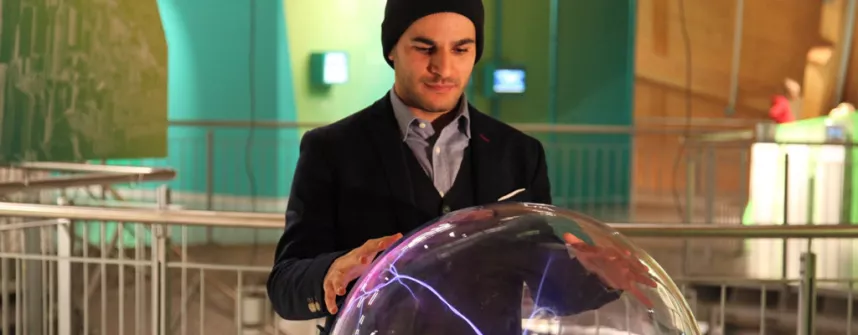I like it! The unusual career of Hashem Al-Ghaili
(Copyright: Bastian Bullwinkel, Universum Science Center)
German Chancellor Angela Merkel is followed by 2.3 million people; Hashem Al-Ghaili by more than 8 million. On Facebook the graduate of Jacobs University, who was born in Yemen and now lives in Bremen, Germany, is a star. In his videos, he explains the world of science in a vivid and entertaining manner and tells about the latest scientific breakthroughs and technological achievements. His page, which has garnered over three billion views from around the world, is known to his fans as the “Science Nature Page”.
The video about the “Hippo Roller”, a kind of rolling water tank, is among the most popular on Hashem’s Facebook page. The tank helps people, especially in rural Africa, to get better access to water; they no longer have to transport it in containers on their heads. The video has been viewed around 40 million times, half a million people have shared it; 7000 commented. Just recently, the manufacturer, a charitable enterprise from South Africa, thanked Al-Ghaili; who they said has helped a lot: “The impact of this video has been far reaching and as a result many more communities are experiencing the benefits of the Hippo Roller”. That made the 26-year-old very happy: “That is what I want. I want to have an influence and contribute to making life better,” says Hashem Al-Ghaili.
That he would succeed in doing so one day could not have been predicted. Hashem Al-Ghaili grows up in a rural region in Yemen. After he graduates from high school, his father wants him to be a farmer, but he is interested in natural science, devours scientific magazines, reads encyclopedias, is a good student. He receives a scholarship from the Ministry of Higher Education in Yemen and gets accepted to study biotechnology at the University of Peshawar in Pakistan. His father lets him go.
In Pakistan, Hashem Al-Ghaili excels in his studies, later on becomes an active Facebook user and makes new friends. One of them advises him, after getting his Bachelor, to continue his studies in Germany. Hashem knows little about the country and the education system in Germany; yet he applies to the German Academic Exchange Service (DAAD) for a stipend, and succeeds in obtaining another scholarship to continue his graduate studies at Jacobs University in Bremen. Today he says: “That was one of the best decisions of my life.”
His fellow students help him overcome the culture shock. The students at Jacobs University come from over 100 countries; many of them have similar experiences, and they provide support to one another. “It really was cool,” says Hashem. “Unlike in my homeland, at Jacobs University I suddenly had access to the latest technologies. I also received all the support that I needed from my professors, particularly from the coordinator of the MoLife program back then, Prof. Sebastian Springer.” In 2015, he completes his Master degree in Molecular Biotechnology and gives a speech at the graduation ceremony as a representative of the graduate students.
He briefly considers getting a doctorate or working in the lab, but then decides differently. Promoting science, spreading knowledge, that is what interests him; he sees himself as a communicator. Hashem takes a job, becomes the Director of Content at Futurism, an American knowledge portal dedicated to science communication. And in his free time he works on his own Facebook page, an average of three hours a day, unpaid.
“I love what I do,” he says. And a lot of people seem to love what he does – all around the world. His fans come above all from the USA, Mexico, Brazil, and India, as well as from Europe. “In my videos, I present science as simply and entertainingly as possible. I want everyone to understand, no matter their nationality or age.” As a rule, the film sequences are between a minute and a minute and a half, often with background music. The topics range from new findings in medical research to new breakthroughs in natural sciences and astronomy to innovations in material sciences. The film material comes from publicly accessible sources, named at the end of the video. He gets a lot of inspiration from scientific publications. “They contain treasures that need to be mined.”
Hashem Al-Ghaili’s journey is not at an end; it goes on. At the end of the year, he will be moving from Bremen to Berlin. His plan is to create full-length documentaries on the incredible wonders of science. In the capital, he also wants to meet with film directors to promote a crowdfunding project. Crowdfunding means that many people – the crowd – support a project with small contributions, so that it can be carried out. His crowd on Facebook has about twice as many people as the city of Berlin. So it is quite possible that he will also have success with this project.
Additional information:
ttps://www.facebook.com/ScienceNaturePage
ttps://www.facebook.com/ScienceNaturePage
